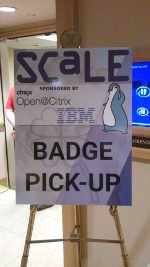A while back, my globe trotting niece Niki Starks made the drive out to our place in Taylor. We spent most of the afternoon categorizing some of the old family pictures I had haphazardly thrown into a box. There were a lot of pictures. Lots and lots of pictures. Pictures of my great grandmother, a woman I barely remember from my childhood.
I remember, at that moment, thinking just how old she looked, and she was old…94 years old. I remember attending her funeral as a young boy. My family has the custom of open casket funerals. Me? I think that practice is grotesque, but that’s just me. I’d rather my last mental image of a person be one of laughing and joy. I remember looking down on my great grandmother’s corpse and thinking she looked better laying there dead than she did the last time I saw her alive.
 And that’s the thing…
And that’s the thing…
** If our coverage matters to you, please consider supporting our work through our FOSS Force Independence 2026 fundraiser. **
The things we remember and the way we remember them. The four hours that Niki and I spent at our dining room table was probably the most important four hours I’ll spend for the rest of my life.
Often, I think of myself as a 61 year old orphan. Silly really…thinking of yourself like that when you are in your 60s. What solidifies that in my mind is that fact that I am the only one left alive in my direct family.
Both my parents died from various cancers and heart/liver disease. That didn’t take a psychic to see coming, given they both smoked and drank like they were in training for an Olympic event. My kid brother died in a nasty head-on truck wreck at 3:44 in the morning less than a mile from his home. I’m fairly sure that’s the time he died, because that’s the time the cracked and bent face of his watch bore when it was given to me. My sister dropped from sight shortly after receiving her share of our brother’s estate. Addicted to heroin and crack cocaine, there’s little doubt why she cannot be found. Odds favored her dying in an alley somewhere or in a cheap motel room that one of her “friends” paid for. I am still scouring the Internet for her death certificate. My older half brother Bill, Niki’s dad…he died in the hospital from heart failure. He was my boyhood hero.





 And that’s the thing…
And that’s the thing…

 That was referring to the first flash sale, held Wednesday morning EU time, in which all devices being made available were sold out in “just a few hours,”
That was referring to the first flash sale, held Wednesday morning EU time, in which all devices being made available were sold out in “just a few hours,” 

 I can say that, knock on wood, we have already had what I hope is going to be the only “black-cat-walking-under-the-ladder” glitch-of-the-show moment a couple of weeks ago when the idiot serving as the publicity chair — okay, that would be me — pulled the wrong list of speakers (the ones not chosen) to start doing speaker interviews with the Publicity Team. Thankfully, I found the error before any interviews were done, but it was a considerable amount of orchestrated work that was thrown out the window and redone with the right list.
I can say that, knock on wood, we have already had what I hope is going to be the only “black-cat-walking-under-the-ladder” glitch-of-the-show moment a couple of weeks ago when the idiot serving as the publicity chair — okay, that would be me — pulled the wrong list of speakers (the ones not chosen) to start doing speaker interviews with the Publicity Team. Thankfully, I found the error before any interviews were done, but it was a considerable amount of orchestrated work that was thrown out the window and redone with the right list.
 Most recently, it was CrunchBang
Most recently, it was CrunchBang